Being children of the 80s and 90s it was impossible to ignore The Simpsons. Nor would we want to. We went out of our way to be interrupted, influenced, and injected with our favorite family from 742 Evergreen Terrace. Get yourself a Butterfinger, put on Simpson’s Sing the Blues and lets nerd out (Comic Book Guy style) to the biggest cartoon sitcom of all time.
The Immortal Goon: I first started watching the Simpsons at my extended family’s house in Southern California. It was the episode Homer’s Night Out, the one where Bart gets the mini spy camera and takes pictures of Homer with an exotic dancer. Upon returning to Oregon, my brother and I turned on the television in our rural coastal town to find a blue screen that said in the cheap digital letters of a VCR, “CHANNEL RESERVED FOR FOX STARTING.” We were amped.
We had only seen a first season episode during the first run, but The Simpsons was already a cultural force to be reckoned with.
Juke: It was the first day of 4th grade. My teacher had cut out silhouettes of Bart and Lisa’s head shape. For all the boys in the class, their name was written on the shape of Bart, and all the girls on the shape of Lisa. The Simpsons have invaded school and I realized Spriggs and I have the coolest teacher around.
I cannot recall the first episode I watched. But I remember living in a funky house in Newport where the only cable hook up was in my bedroom. Yes, If you wanted to watch t.v., come one come all into my room for your televised entertainment. I was awakened by the angelic choir sing “The Simpsonnnns” as the intro started. I raised my head from my slumber and watched from my bunk bed above where my sister was sitting.
Rob: As far as nostalgia goes, there are few things that beat counting down the hours on a Thursday or Sunday to a new Simpsons episode when I was a teenager. Growing up I didn’t have Fox in my house until I moved to Roseburg in 1992, so I missed the first few seasons. I saw my first episode at Jack’s house circa 1991 spring break. I had this “Underachiever” on my wall growing up.
The Immortal Goon: The next episode we watched was probably, “Crepes of Wrath,” when Bart gets sent to France. From that time on, it was something my brother and I did with our parents every single Thursday, and then every single Sunday until I graduated high school almost ten years later. It was part of the zeitgeist of the time, but for an Oregonian it was more. One of us had finally made it. Everyone would be watching a show set at a Portland address with characters based on Oregonians.
This made it easy to get into it. I was the child of educators, and I liked the way that the educators were portrayed in the series. The teachers would cynically smoke cigarettes and try to keep themselves entertained, just like Bart would do bad things to keep himself engaged. The teachers were the same as the students, even if they would wait until the students were out of earshot before celebrating like mad for the summer. Not only did this make the teachers fully realized characters like the teachers I knew, but ultimately the teachers and the students were trapped in the same system. They knew that they had to be there, they knew that it was best, but the low priority society put into it, the low financial standards, and everything else plagued both teachers and students.
Verity: I remember sitting in my childhood bedroom (Single Wide Til I Die), up late, watching The Simpsons on The Tracy Ullman show. It was a cartoon and so it was good by me. Little did I know it would become one of the most influential cultural impacts of my life. I would stop anything to watch an episode.
Rob: I have many favorite characters but if I had to single out just one I’d go with Mr. Burns.
Juke: My favorite character is also Mr. Burns. I love how out of touch he is with younger generations. His 1920’s lexicon is so well crafted and when he gets on a roll its cacophony magic. The employee to Mr. Burns relationship is a perfect insight to how most Americans feel about their bosses. I love how Mr. Burns can be so weak. These are what splits my side in laughter. Mr. Burns getting a sponge bath from Smithers and says: “Careful, Smithers! That sponge has corners!” to which Smithers replies: “I’ll go find a spherical one, sir.” Smithers then rests the moist square sponge on top of Burns’ hat and leaves to find a new sponge. The weight of the sponge then proceeds to sink Mr. Burns into the tub.
Verity: Everything’s coming up Milhouse for my favorite character. I love what a tool he is. Nobody likes him. He has nothing going for him. Even his best friend, Bart, has no real allegiance. Out on the playground, Bart says to Lisa, ” I couldn’t find much on our rivalry, but I did manage to get Milhouse on America’s Most Wanted.” After the agent sees him and says to his associates, “Try to take him out alive” Milhouse says, “Oh no! Not again.” Cut to an amazing spoof of The Fugitive.
Milhouse is such a tool that he delivers a love letter to Nelson for his own crush, Lisa. When Nelson thinks Milhouse is coming on to him, the next cut is Milhouse being wheeled out on a stretcher with blood coming out of his nose. The medic says “He can’t hear you right now, we had to pack his ears with gauze.”
The Immortal Goon: My favorite character of all was Lionel Hutz, the lawyer voiced by Phil Hartman (RIP). He was used sparingly enough that he was always funny in his schtick. He might even be the person I quote the most. I can barely walk by an Orange Julius or think about a babysitter, or hear the title of, “The Neverending Story,” without him coming into my head. He was not only everybody’s worst fears about a lawyer, but worst fears about themselves and their imposter status at doing important tasks.
At one point I would have said that my favorite character was Principal Skinner. There was something so delightfully square about him. Sharpening pencils late at night, the almost patronizing but entirely serious laugh followed with, “Oh, mercy!” He was desperately trying to keep the system centered. There was something about him that couldn’t see what the others in education could see. The fact that he was a trouble Vietnam vet suited his position. Sitting in the dark with his flashbacks, but holding onto the cheery persona of a grade school principal and not understanding why his enthusiasm wasn’t shared by everyone. “Could I be so out of touch,” He mused once while looking for Bart skipping school, “No, it is the children that are wrong.”
Which is why the worst episode in the series is, “The Principal and the Pauper.” This is, traditionally, the end of The Simpsons Golden Age. And I can’t say why better than Harry Shearer, the voice of Skinner, said it:
“I said, ‘That’s so wrong. You’re taking something that an audience has built eight years or nine years of investment in and just tossed it in the trash can for no good reason, for a story we’ve done before with other characters. It’s so arbitrary and gratuitous, and it’s disrespectful to the audience.’”
The Immortal Goon: The difference between The Simpsons and Family Guy, for instance, was that there was something on which the Simpsons could hang the humor. For instance, if some old guy said that a dead patient was haunting him because of all the arguments the patient had lost, it wouldn’t be funny at all. In Star Trek, when Bones says something similar about Spock, it’s funny because we understand the dynamic. We know that Bones would actually think that he won the arguments he had with Spock. And because we know Spock, we can assume that he was not vindictive enough to go to such lengths for petty revenge. The knowledge we have of both characters is what makes the joke funny. When a character can be rewritten and repurposed for any reason, the character ceases to mean anything, and our knowledge of that character no longer can inform us of the humor. There are no stakes when everything is set up for a petty punchline with no consideration of the actual characters.
Juke: Family Guy is just empty calories. There’s nothing you walk away with from watching an episode.
The Immortal Goon: Some shows are set up like this. Family Guy revels in being random broad strokes. But the Simpsons had been different. Everybody meant something. Springfield was populated with real people that did real things, and we once understood how they would react to things-it made the jokes more funny. The Golden Age didn’t end with a certain episode, and things were already in a decline, but the type of humor changed when the characters became cheap and empty ciphers no more amusing than the increasingly long list of guest stars playing themselves.
Counter this with the best episode of The Simpsons, “Marge versus the Monorail.” At the time, apparently, there were those that thought it was too absurdist, but it is in retrospect the best episode in part because the characters stand out in an absurd situation. Lyle Lanley, played again by Phil Hartman, is particularly amazing in the episode. But everybody acts as their characters should, advancing every joke forward, and punctuating every beat-by-beat moment of humor. Leonard Nimoy’s cameo is often cited as one of the best of the show. Like the absurdist storyline, Nimoy serves as an outside influence that each character can play with. Quimby can’t keep Nimoy’s resume straight as he’s too corrupt to care. Moe wants to switch seats with him because Nimoy said something poetic. But perhaps the best thing about Nimoy in the episode is that it took me three or four times of watching to realize that he was Spock playing Nimoy in order to save Krusty, who somehow serves a purpose in the future that we don’t understand.
Juke: On March 28, 1999 I turned 18 years old. It’s also the date that Futurama aired and I realized my favorite cartoon of all time is now dead and my youth has been lived. For The Simpsons, the creative attention is now being pulled to another project. Very rare does a side project equal the success of the originator. And very rare does the originator retain its quality. When band members want to do a side project, the focus is lost on the original work at hand. I know, It’s inevitable in the world of creation. Artists want to try new things eventually. That’s why I respect shows and projects when they know it’s over. Seinfeld is a perfect example. If the Simpsons went off the air when Futurama came on, I’d respect The Simpsons so much more but they’re entering their, sigh, 27th season. Now I have to sound like a total nerd and say: “My favorite Simpsons episodes are from Season 3 to Season 8.”
Rob: Without a doubt my favorite episode is “Bart sells his soul”.
Juke: My favorite episode is also probably “Bart Sells His Soul.” Or “Bart vs. Australia.”
Verity: My top ten favorite Simpsons episodes are:
6. Kamp Krusty
My most favorite episode, 22 Short Films About Springfield, aired on April 14, 1996. I was 12. I tape recorded the episode so that I could transcribe the script and memorize it… like you do. My thought was that I would put together a cast of the children in the neighborhood and do a live reading. Surprisingly, that didn’t pan out!
At the time I hadn’t seen Pulp Fiction and all of the references were lost on me but that just added to the appeal after I had watched the movie and come to understand even more layers of the humor. I almost didn’t count this episode as one to be in the running for a favorite because it’s cut from such a different mold, almost like the halloween episodes.
Every second of this episode is gold. FUCKING GOLD. There is no better episode of cartoon television.
♬♬ Some folk’ll never eat a skunk,
But then again, some folk’ll…
Like Cletus, the Slack-Jawed Yokel!!!
Most folk’ll never lose a toe,
But then again, some folk’ll..
Like Cletus, the Slack-Jaw Yokel!!! ♬♬
The Immortal Goon: The most cynical episode of the show was, Mr. Lisa Goes to Washington. The logging industry and others were upset at the way a logging lobbyist was shown to be corrupting the government in DC. But the real cynicism is the ending of the episode. Lisa’s despair at the corruption and chauvinism that control the country is observed and the government immediately springs into action. The perpetrators are arrested, Congress kicked into action, and President Bush (the first) signs the Bill into law, quipping that he works for every single person in the United States.
The humor here works because we know this would never happen. It’s just as absurdist as the idea of a town buying a giant magnifying glass to place next to the skyscraper made of popsicle sticks. We laugh because we know that Lisa’s previous vision of the people in power in United States, pigs feeding from a trough, is our own reality before moving along to cartoonish version of things.
Rob: I really wasn’t much into the show after the 9th season. Specifically the “Trash of the Titans” episode where they move the town. Boo! However, the more I see of episodes after that makes me realize it’s by no means not watchable.
More Falls Society Roundtables:
Toys, Action Figures, Nostalgia, and Ninja Turtles

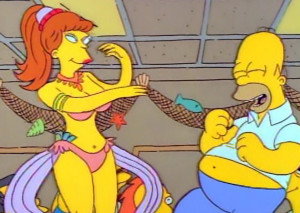
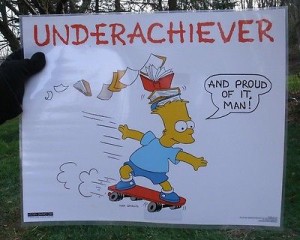
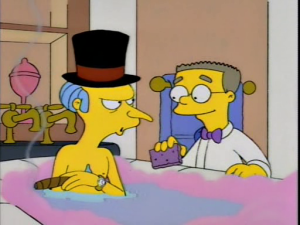
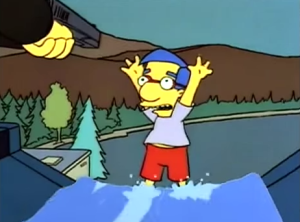
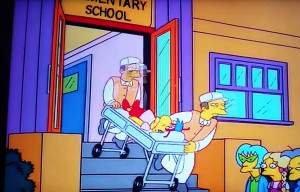
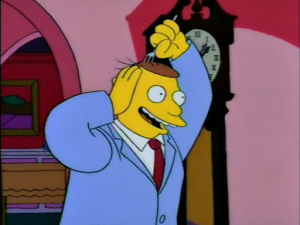

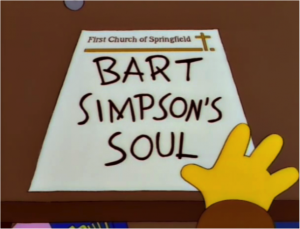
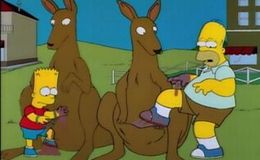
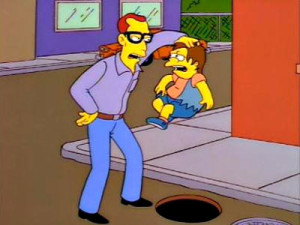

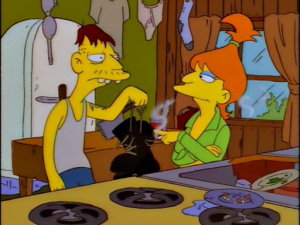
So fun. The Simpsons shaped so much of my humor. I owe a ton to this cartoon.